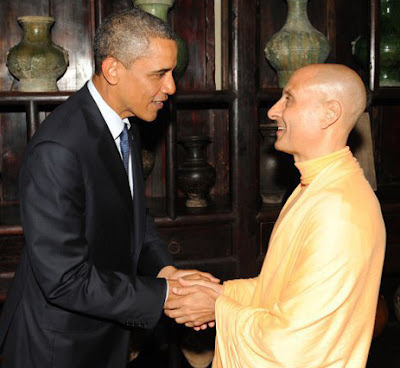I got into a terrible argument recently with a friend because of something I said.
It started when someone (on Facebook of course) asked me, “What do you have to say about Prabhupada’s condemnation of homosexual activity?”
In hindsight, I should have asked him to give examples and then addressed the examples one by one. I don’t think there would have been too many. Instead, as usual, I blurted out exactly how I feel – without pausing for diplomacy or tact or all that much sensitivity. “I don’t like it.”
My friend really hated that. He took “I don’t like it” to mean “It is wrong.” But “I don’t like it” doesn’t mean “It is wrong,” it means “I don’t like it.”
“Why would you not like it if its not wrong?” he asked.
I don’t like it because its very complicated. It is very complicated becaus it triggers a million reflexes that make it very difficult to clearly understand or explain.
In my original answer to the question, the next sentence after “I don’t like it” was a quick summary of why I don’t like it. Its another flaw of mine that I often make these summaries vastly too summarized. I skipped the step of explaining why I don’t like it (because it is so difficult to clearly understand and explain) and jumped to a summary of the essence of how I try to understand and explain it. I said, “I think its a product of the time, place and circumstance of his upbringing.”
My friend read this to mean, “I think Prabhupāda is an ordinary human being whose opinions are generated by the modes of nature and the reactions of karma.” That’s not what I meant. I meant that even Avatāra, Mahā-bhāgavata, Sad-guru appear within a certain setting in this world, and use what is at their disposal in that setting to communicate with the people in that setting and thereby bless them. Śrīla Prabhupāda appeared at the end of the 19th century and was educated by the British in Kalkatta, at Scottish Church College. As a result he was fluent in English and exposed to English victorian culture. I don’t think this is why he did not have a positive opinion of homosexuality. I think any orthodox, traditional non-tantric yogi wouldn’t go out of their way to have a positive opinion of homo- or hetero- sexuality. But I do think it is a very big part of the reason that his discriptions of homosexuality are distasteful to a majority of late 20th and early 21st century readers.
I was not expressing a denigration of Prabhupāda. After all, the next sentence I wrote in my original reply shows that my opinion of Prabhupāda is high and that I don’t like how people on either side of the issue use his comments to present him in a way that most people find low and ugly. I wrote, “I also think it is over-emphasized by people who want to denegrate him for one reason or another.”
My friend remains quite disappointed in me for having the opinion that material circumstances would have something to do with Prabhupāda – but I remain convinced that I am being realistic, not offensive. The mahā-bhāgavata who descends into this world takes the material circumstances he or she descends into and utilizes them for divinity in a way analogous to putting an iron rod into fire. The rod itself is not fire, but it becomes as hot and as bright as fire.
I think this is an opinion worth defending because I think the concept that “context is all-important” it is a central, fundamental principle of Vedic Hermeneutics (the Vedic system for understanding conflicting or complex statements). The context in which an ācārya makes a statement is an essential part of correctly understanding that statement. The statement’s relation to the ultimate śāstric context is another part, of paramount importance (since śāstra is the ultimate pramāṇa [authority] of our Gauḍīya Vedānta school; and the ācārya is an ācārya due to his or her relation to śāstra).
We can exploit the myriad connotations, denotations and possible contexts of words to derive almost any meaning from almost any statement. Hermeneutics (rules of understanding words) are therefore essential. The essence of Vedic Hermeneutics is that the original, intended meaning is understood by establishing the actual context of the words, and especially the context and intent of the speaker. In the case of an ācārya speaking with transcendental context, the context and intent of the śāstra he exemplifies and teaches is also an essential factor to be considered if we hope to have fully accurate understanding of the ācārya.
The meaning of śāstra or of śāstra’s teacher, the ācārya, is absolute, but the method through which śāstra and ācārya communicate is relative. This is why the same śāstra and same ācārya says many different things, often contradictory, to many different people in many different contexts and circumstances. The actual meaning of all these things is one absolute truth, but language and specifics through which that truth is expressed is relative to the person expressing it and the person it is being expressed to.
This does not mean that Prabhupāda is “an ordinary being whose words were not dictated by Krishna.” It means that Prabhupāda is a mahābhāgavata recieving diction from Krishna and expressing it to the world in context.
Śrīla Prabhupādāya daṇḍavat.
– Vraja Kishor dās
VrajaKishor.com
Tagged:
A. C. Bhaktivedanta Swami Prabhupada,
Absolute Truth,
acarya,
Guru,
pure devotee,
relative truth 
























